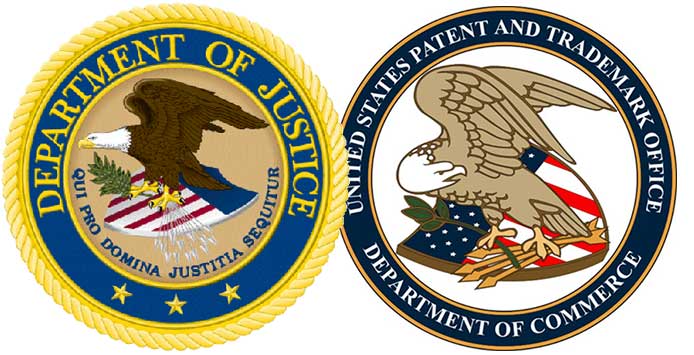In a joint policy statement issued late Tuesday, the Department of Justice and the U.S. Patent and Trademark Office said companies that own so-called standard-essential patents should rarely be allowed to garner sales bans due to infringement findings.
While coming down hard on tech companies leveraging their SEPs to gain an advantage in the U.S. market, the statement is also an appeal to the U.S. International Trade Commission to keep the public interest in mind when ordering injunctions, reports Reuters.
"The USITC, may conclude, after applying its public interest factors, that exclusion orders (sales injunctions) are inappropriate," the statement read.
Instead of injunctions, the Justice Department and USPTO said monetary damages should be implemented as punishment in cases where infringement is found. The bodies went on to say that only in a handful of specific cases should sales bans be levied.
The policy statement is germane to ongoing worldwide smartphone litigation, much of which involves the battle between Apple and multiple Android manufacturers including Samsung and Google's Motorola.
As for the ITC, the commission is currently reviewing a decision from an administrative law judge that cleared Apple of infringing on Samsung patents, two of which are deemed standard-essential.
Tuesday's policy statement is not binding in court, but federal judges may heed the opinions in upcoming cases.
 AppleInsider Staff
AppleInsider Staff








 Charles Martin
Charles Martin

 Malcolm Owen
Malcolm Owen
 William Gallagher
William Gallagher

 Christine McKee
Christine McKee
 Wesley Hilliard
Wesley Hilliard









18 Comments
Federal Judges don't answer to the DoJ Prosecutors, and especially not to the US Patent and Trade Office. The Judicial Branch isn't a subbranch of the Executive Branch.
This is an absolutely awful decision by the Obama Administration and undercuts the whole idea of intellectual property. Why reward intellectual thieves? Intellectual property is critical to our economy in the 21st Century.
Paul Harding, FAIA
Harding Partners Architects
Chicago
This is an absolutely awful decision by the Obama Administration and undercuts the whole idea of intellectual property. Why reward intellectual thieves? Intellectual property is critical to our economy in the 21st Century.
Paul Harding, FAIA
Harding Partners Architects
Chicago
Amazing. An article that short, and you still didn't even bother to read it before posting. Either that, or you haven't wrapped your head around the concept of the "Standards Essential Patent", in which case, why post on something you don't understand? I suppose there's also the third possibility this was a lame attempt to troll, but I'll assume that's not the case ... for now.
So, what "intellectual thieves" are you referring to? How is this undercutting the "whole idea of intellectual property"? The piece is talking about [generally] disallowing sales bans requested by IP holders who abuse SEP patents (for example, by demanding unfair/unreasonable licensing fees for a contribution that's encumbered with FRAND obligations). It has nothing to do with non-SEP IP infringement or sales bans of [non-SEP] infringing products.
While coming down hard on tech companies leveraging their SEPs to gain an advantage in the U.S. market, the statement is also an appeal to the U.S. International Trade Commission to keep the public interest in mind when ordering injunctions, reports Reuters.
Good luck. The ITC's entire purpose and sole enforcement power is stopping importation of infringing products. Not even Presidential appeals work on them most of the time.
They might issue a policy statement saying they'll try not to use exclusions in most cases, but they sure aren't going to give them up entirely.
This looks like a power struggle between departments.
Only the courts can issue monetary damages. The ITC cannot. It only has exclusionary powers.
Or not. Some might even feel that the USPTO overstepped their bounds by getting involved.
I'd love to skip forward 20 years and see if this problem is solved yet.
Pay attention to the actual statement from the DoJ. It's not even as restrictive as the recent agreement between Google and FTC. The Justice Dept appears to be OK with SEP injunction requests as long as the licensee is unwilling to negotiate. Note the use of that specific word, which leaves the open interpretation of what encompasses negotiation. If the licensor makes an offer which is rejected but the potential licensee fails to make a counter-offer, is it a negotiation? IMHO it would not be. At least one Federal judge already ruled that negotiations on SEP licensing terms should not be required in the first place. And what if the licensee makes a ridiculously low counter-offer. Is it still a real negotiation? Hardly a clear and concise statement issued by the DoJ and USPTO.
At the end of the day the only thing clear is that injunctions for standards-essential IP is certainly legal and acceptable under certain circumstances. Otherwise the appropriateness for anyone other than Google is murky. The FTC/Google agreement doesn't apply to other SEP holders and the DoJ appears to be much more open to the use of injunctions.